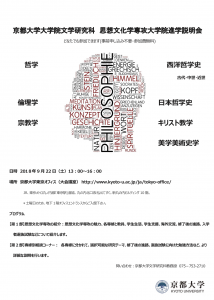長らく本哲学専修で教鞭を取られ、本学名誉教授でもある伊藤邦武先生(現龍谷大教授)が、日本学士院の会員に選ばれました(学士院プレスリリース)。心からお慶び申し上げます。
Author Archives: OtsukaJun
大学院進学説明会
京都大学大学院文学研究科・思想文化学系 大学院進学説明会開催のお知らせ
京都大学文学研究科・思想文化学系では、以下の要領で大学院進学説明会を開催いたします。学年、学部、学内外を問わず、どなたでもご参加いただけます。事前の申し込みは必要ありません。
なお、思想文化学系では、本年度より、従来の入試に加えて、夏期入試も行うことになりました。それについてもこの機会にご説明いたします。
思想文化学系の諸専修への進学に関心をもつ皆様のご参加をお待ちしています。
- 日時: 2018年5月12日(土) 14:00〜17:00
- 場所: 京都大学文学部 第1・2講義室(文学部校舎内)
(http://www.kyoto-u.ac.jp/ja/access/campus/yoshida/map6r_y/)
プログラム:
【第1部】全体の説明
- 思想文化学系の魅力
- 各専修・教員の紹介
- 学生生活について
- 学生支援について
- 海外との交流について
- 修了後の進路について
- 入学者選抜試験について
- 質疑応答
【第2部】各専修に分かれての説明
- 各専修にわかれて、選択可能な研究テーマ、修了後の進路、選抜試験に向けた勉強の方法など、より詳細な説明を行います。
日立京大ラボとの共同研究のプレスリリース
本件専修が日立京大ラボと共同で行っている、「Society 5.0に向けた応用哲学・倫理学の産学共同研究」について、先日プレスリリースを行いました。
学内リンク:Society 5.0に向けた応用哲学・倫理学の産学共同研究の開始を発表しました。(2018年4月3日)
なお本発表の様子は、同日付けの京都新聞社会面にも掲載されました。
CAPEレクチャー(Prof. Michael Weisberg)のお知らせ
近刊『科学とモデル』(名古屋大学出版会)の著者である、ペンシルバニア大学教授のMichael Weisberg博士をお迎えして、以下のような講演会を行います。Weisberg博士はBiology & Philosophy誌の編集長でもあり、当日は午前中より、同誌への投稿を含めた国際論文投稿How-toに関するワークショップを行います。奮ってご参加下さい。
Speaker: Prof. Michael Weisberg (University of Pennsylvania)
Date: October 21st 2017
Time: 16:30-18:00
Venue: Large conference room in the basement, Faculty of Letters MainBuilding, Yoshida Campus, Kyoto University.
Title: Confirmation Theory for Idealized Models
Abstract:
When a flu pandemic strikes, who should get vaccinated first? What’s our best strategy for minimizing the damage of global climate change? Why is Philadelphia racially segregated? Why do most sexually reproducing species have only two sexes, in roughly even proportions? These and many other scientific and practical problems are studied with highly idealized mathematical and computational models. When should we believe these models and follow the advice they suggest? Philosophy of science tells us that we should believe models when they are well-confirmed, but this simple answer isn’t very helpful here. Traditional confirmation theory explains how empirical evidence bears on the truth of hypotheses and theories, but the highly idealized models at the heart of the life and social sciences are known to be false from the outset. Moreover, classical ideas about confirmation have been developed for relatively simple hypotheses, while many contemporary models have thousands of variables.
Despite these challenges, it is possible to develop an account of model confirmation that can speak to the reliability of models and their results. I will sketch a theory that has two parts: First, theorists validate models, confirming hypotheses about model/target system relations. Second, they employ robustness analysis to investigate the stability of model results. Taken together, validation and robustness tell us when models are reliable and help us understand the appropriate domain of their application. Not only does this theory better align our accounts of scientific method with modern theoretical practice, it also helps us understand when to believe the results of models.
CAPEレクチャー(Prof. Kevin Kelly)のお知らせ
以下の要領でCAPEレクチャーが開催されます。奮ってご参加ください。
Prof. Kevin Kelly, Carnegie Mellon University
(joint work with Konstantin Genin, Carnegie Mellon University)
Date: June 28 (Wednesday) 2017
Time: 18:15 – 19:45
Venue: Large conference room in the basement, Faculty of Letters Main Building, Yoshida Campus, Kyoto University.
Title: Deduction and Induction in Statistics
Abstract: The distinction between inductive and deductive reasoning is among the most basic in philosophy. But where, exactly, should one draw it? The logical positivists drew it in terms of logic—deductive inferences are those in which the conclusion follows by first-order logic from the premises. By that standard, all statistical inference is inductive, because the proposition that a sample was received never logically entails the intended conclusion. We propose, instead, to characterize deductive inference in terms of guaranteed, arbitrarily low chance of error. We present three arguments in favor of the proposal. (1) It reflects the situation of real, as opposed to mathematically formalized, deduction. (2) Unlike the received view, it allows one to transfer logical insights from epistemology and the philosophy of science to issues that arise in advanced statistical data analysis. (3) Finally, it rests on a deep, topological analogy between the logical and statistical cases. Time permitting, we illustrate the idea with a statistical application of tremendous practical and ethical consequence: the inference of causal connections from non-experimental data.

